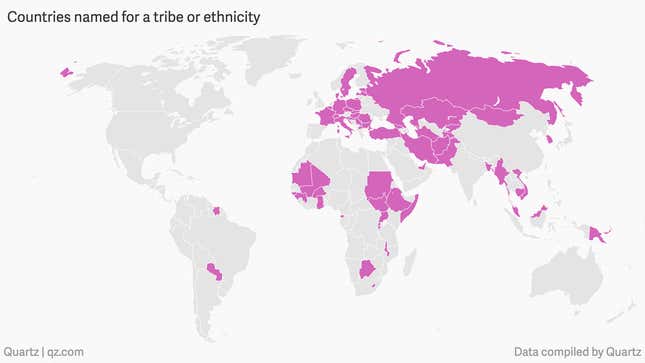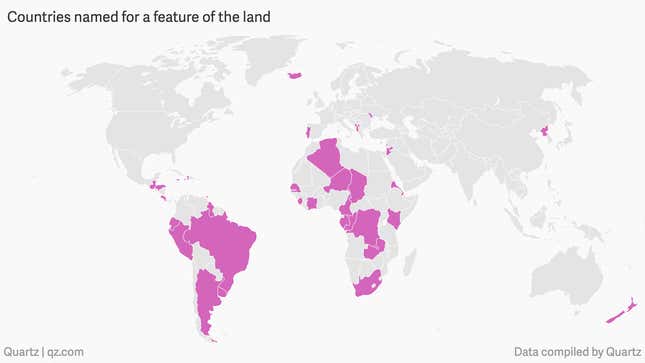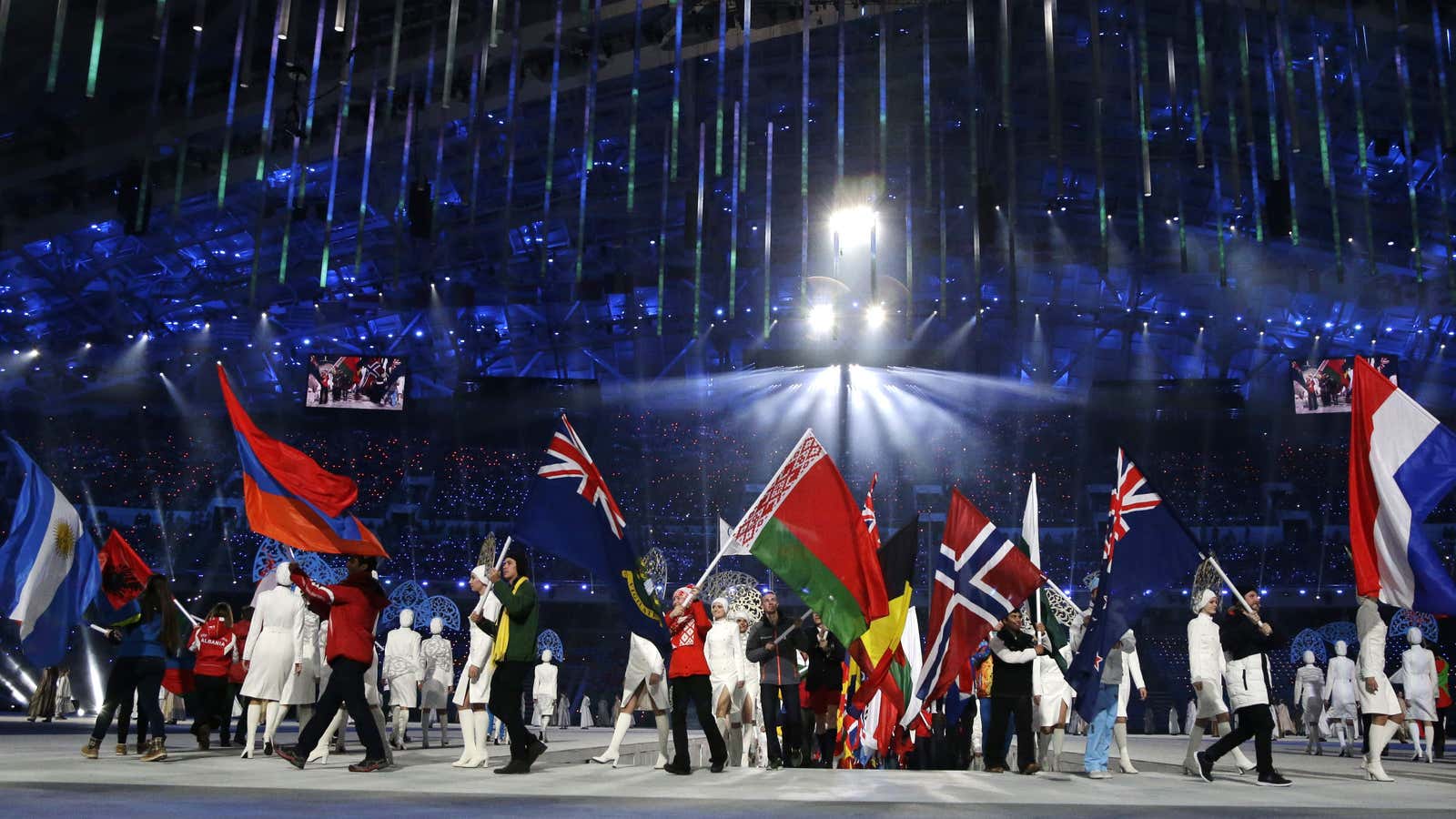When the US president says “America first” to a room full of world leaders, he probably doesn’t mean to invoke the spirit of a 15th-century Italian. When Charles de Gaulle proclaimed, “La France n’est pas seule!” he likely wasn’t talking about a Germanic tribe from two millennia past. And Gandhi’s appeal to Britain to “quit India” definitely wasn’t just about the people living near the Indus River.
Our countries’ names instill in us a sense of pride. Our leaders use them as emotional triggers in speeches, and so do citizens, creating slogans around country names to rally support on social media and conjure unity in protests. It’s easier than putting “make the land between Mexico and Canada great again” on hats. But just like our first names are handed to us without our input, the names of nations are inherited, arbitrary, and, often, absurd. Sometimes we get names we don’t want, and our efforts to correct don’t stick.
According to our research, the majority of country names fall into just four categories:
- a directional description of the country
- a feature of the land
- a tribe name
- an important person, most likely a man
Further, our research reveals that the way countries get their names is hardly ever democratic, and very few are rooted in the national qualities we like to associate with them, like liberty, strength or justice.
Toponymy, the study of place-names
To figure out what we’re really saying when we say “America,” or “Papua New Guinea,” Quartz relied on the gold standard toponymy reference book, the Oxford Concise Dictionary of World Place-Names, by John Everett-Heath. We manually compiled information on all 195 independent states recognized by the US, to create a taxonomy of the world’s political order. Where the dictionary was unclear, we cross-referenced origin stories. We looked at country endonyms—the name a country calls itself—where markedly different from a country’s English name. (So 中国, or Zhōngguó, instead of China, and Suomi, not Finland.) If a country was named after an existing place—Chad after Lake Chad, or Algeria after the city of Algiers, for example—we did our best to seek the meaning of the original name.
A few things to keep in mind: Name origins are often murky, so this is an inexact exercise. Sometimes the most fun or attractive origin stories are bunk. “Beware folk etymology (an effort to explain a name by its resemblance, in sound or spelling, or to some other name or word, or its possible association with a person or event),” writes John Everett-Heath by email. “Myths and legends may be entertaining, but rarely of value.”
English-language resources obviously have their own flaws and biases, and there are likely to be gaps in places under-studied by English-speaking academics. And sometimes tracing an origin leads to a dead end: Like with etymology, eventually you go far back enough and you hit a wall.
That said, here’s a taxonomy of the world’s country names as far as we know.
Type one: Tribes, kingdoms, ethnic groups
By far the greatest plurality—a third—of the world’s countries get their current names from some older group of people. There’s a big cluster in Europe: France is named for the Franks; Italy for the Vitali tribe; Switzerland for the Schwyz people. 대한민국, romanized as Daehan Minguk, is the Korean name for South Korea. “Daehan” means “Great Han” or “Big Han,” after three Han tribes from the 2nd century BC. (“Han” can also mean “big.”) Vietnam means Viet people of the south.
In the last century it’s also been a way for countries to reclaim a much older identity: In 1957 the Gold Coast gained independence from the British and was renamed Ghana, after the older empire that broke up in the 13th century.
A few countries have names that describe their people’s attributes: Burkina Faso, coined in 1984, means “land of honest men” or “land of incorruptible people.” Guinea and its namesakes—Guinea-Bissau, Papua New Guinea, Equatorial Guinea—come possibly from the Tuareg word “aginaw,” “black people,” used by the Portuguese in the 15th century to refer to a larger region of west Africa.
Papua New Guinea is thought to be a description of the people native to Melanesia, “papua” reportedly meaning “frizzy-haired,” and Guinea from the Spanish explorer Ynigo Ortiz de Retes, who in 1546, thought they looked like the African Guineans (i.e. they had dark skin).

Type two: A special land
About a quarter of the world’s country names come from some aspect of the land.
Algeria is named after its capital city, Algiers, meaning “the islands.” That name once described the city’s bay, which once had tiny islands in it, but which have since become connected to the mainland or been destroyed in development of the harbor. Montenegro’s endonym, Crna Gora, means “black mountain,” a reference to the southwestern mountain Lovćen. Iceland is, indeed, what it sounds like, though it’s a misnomer. Says Everett-Heath in the dictionary:
Allegedly renamed Iceland from ís ‘ice’ by the first Norse settlers in the 9th century. Their intention was to deter visitors coming to an island which had in fact comparatively moderate annual temperatures (because of the Gulf Stream) and was much warmer than would be expected for a country so far north.
Some names about land features are clustered in places where borders were drawn up by colonialists, perhaps because they were given by outsiders seeing the lands through the eyes of foreigners.
It’s not clear which explorer named Costa Rica (“the rich coast”), but one account suggests it was Christopher Columbus, who saw indigenous people wearing gold and didn’t realize it was imported. The Spanish gave Honduras its name, meaning “depth” or “deep water,” and they also named Barbados, or “bearded ones,” allegedly after the great banyan tree found there, ficus citrifolia, because of their long aerial roots.
Sierra Leone is thought to have been named “lion mountains” by the Portuguese, probably a reference to the roaring sound of thunder in the hills above Freetown, not actual lions. Singapore means “lion city,” and the lion head is a national symbol. But there aren’t any known lions in Singapore. According to legend the Sumatran prince Sang Nila Utama was hunting in Singapore and came across an animal he thought was a lion, “singa” in Malay, and gave the name Singa Pura to the island he was on.

Type three: East, west, somewhere in the middle
About 25 countries are named for their location. Zhōngguó means “middle kingdom,” and Nippon, the endonym for Japan, is “land of the rising sun,” referring to the fact that Japan is east of China, i.e. in the direction of the sunrise from China’s point of view. Norway, “northern way.”
Timor-Leste means “east east.” It comes from “timur,” Malay for “east,” which according to Everett-Heath, refers to the fact that Timor is east of Java and Sumatra, and “leste,” Portuguese for “east.” Australia means “southern,” based on a land very far south theorized by the ancient Greeks, Terra Australis Incognita, “Unknown Southern Land.”
Type four: Men
By our count, there are roughly another 25 countries named for some person of importance—in all cases but one, a man. According to language blogger Paul Anthony Jones, St. Lucia, a third-century woman from Syracuse, is the exception.
Some are obvious: The Philippines are named after Spain’s 16th-century King Philip II, and Bolivia is named after the Venezuelan revolutionary Simón Bolívar. Israel is another name of Jacob, thought to be the patriarch of the Jewish people. Mauritius is named for Maurice of Nassau, the 16th-century Netherlands magistrate, and Swaziland is named for the Swazi people, who are said to get their name from the 19th-century king Mswati II.
The Solomon Islands also belong to this category, though in a round-about way: The Spanish explorer Álvaro de Mendaña de Neira came to the islands in 1568. Through some mix-up, perhaps by his own doing, rumors circulated that he found gold, and the islands were named after the wise, wealthy biblical king Solomon, who was said to get his gold from Ophir, an unidentified land known for its riches. Alas, by most accounts Mendaña found no such thing.
The United States of America is named for the Italian explorer Amerigo Vespucci, the person credited with realizing that the continent the Europeans bumped into in the late 1400s was not India. In 1507 German cartographer Martin Waldseemüller suggested these lands—at the time, referring just to South America—be named “from the discoverer Amerigo…as if it were the American land, or America.”
Columbus appears to have left his mark on the most countries of any one person, eight countries total. He’s thought to have named Saint Kitts (shortened from Christopher) and Nevis, Saint Lucia, and Saint Vincent and the Grenadines after his favorite Christian saints. Columbus also named Antigua and Barbuda after the Church of Santa Maria de la Antigua and the Trinidad (in Trinidad and Tobago) after the Holy Trinity.
Tobago, according to the Commonwealth, comes from the Carib word “tavaco,” the pipe in which the Caribs smoked tobacco, and which, allegedly, Columbus thought was neat. Writes Everett-Heath in his dictionary:
An island so named by Christopher Columbus when he discovered it in 1498. Columbus was impressed by the natives’ practice of stuffing the leaves of the tobacco plant in pipes and setting fire to them in the belief that this had medicinal value.
Colombia is named after Columbus, though not by him.
NB. Costa Rica, Trinidad and Tobago, and the Solomon Islands aren’t the only countries whose names have dubious foundations. Venezuela was named by a Spanish expedition—which included Vespucci—that saw houses built over water and thought it looked like Venice. Grenada was named because sailors thought they looked like Granada, Spain. Canada likely comes from the Huron-Iroquois word “kanata,” which means “village” or “settlement,” confused by 16th-century French explorer Jacques Cartier to be the name of a place.
The best of the rest
There are 20 or so mysterious countries whose name origins are disputed or unknown. Malta could mean “refuge” or “bees,” and a host of answers have been offered for Nepal, none definitive: “beginning of a new era,” “center country,” “holy place,” ”home of wool.” The origins of a few countries like Syria and Palau are unknown.
And then there are a few countries whose names don’t fit into any major category—and these are arguably the most poetic. There’s tiny Comoros off the east African coast, whose name means “moon,” after the Arabic “al qamar.” Mexico is also said to have lunar roots, the Spanish simplification of the Aztec city, Metztlixihtlico, meaning “in the navel of the moon.”
There’s possibly the most badass, Druk Yul, Bhutan’s name for itself, thought to mean “land of the thunder dragon.” And a smattering of countries whose names are virtues, like Liberia’s “free land.”
Nauru, an island northeast of Australia, is perhaps the most delightful, reportedly named after the indigenous word “anáoero,” “I go to the beach.”
A previous version of this story included Bhārat, another name for India, in its map of country names based on ethnicity or tribe. The name can be traced to the Bharata dynasty, founded by the mythical king Bharata. The map has been updated.
